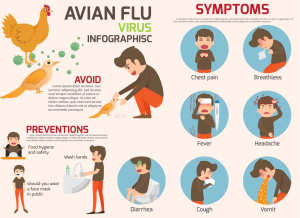The World Health Organisation (WHO) says the number of dairy herds affected by the avian influenza virus (H5N1) has almost tripled to 92 in 12 countries.
Also, the number of human cases has increased from one to three and the number of people being monitored has more than doubled to 500.
According to experts, the H5N1 is one of the strains of the influenza virus that primarily infect birds, but can also infect humans.
“This type of flu is most often contracted by contact with sick birds. It can also be passed from person to person.
 “Symptoms begin within two to eight days and can seem like the common flu. Cough, fever, sore throat, muscle aches, headache and shortness of breath may occur.
“Symptoms begin within two to eight days and can seem like the common flu. Cough, fever, sore throat, muscle aches, headache and shortness of breath may occur.
“The disease can carry a high mortality in humans. Some antiviral drugs, if taken within two days of symptoms, may help,” experts say.
Speaking on the latest spread of the H5N1 strain od bird flu, WHO Director-General Dr. Tedros Ghebreyesus, said on Wednesday during an online media conference that since 2003, there have been 893 reported infections of H5N1 in humans, including 11 so far in 2024 — five in Cambodia, three in the U.S., and one each in Australia, China and Vietnam.
According to him, in that time, the virus has not shown signs of having acquired the ability to spread easily among humans.
“That remains the case, which is why, at this time, WHO continues to assess the risk to public health as low.
“In recent years, H5N1 has spread widely among wild birds, poultry, land and marine mammals on several continents,” he said.
Ghebreyesus said that WHO recommended that anyone working with any infected animals, in any country, should have access to, and use, personal protective equipment.
“Follow-up, testing and care of people exposed to the virus should continue systematically.
“Early medical care and support, and thorough and timely investigation of every human infection is essential to evaluate and interrupt potential onward transmission between humans,” he said.
According to him, WHO is monitoring multiple avian flu viruses in humans through the Global Influenza Surveillance and Response System.
He said that surveillance of flu viruses among animals globally must also be intensified to rapidly detect any changes to the virus that could pose a greater threat to humans.
“These systems are only as good as the timely detection and the sharing of viruses and information.
“Collaboration, communication and information sharing between the animal and human health sectors is essential in all countries. This is the meaning of One Health,” he said.
Avian influenza virus infections in humans may cause diseases ranging from mild upper respiratory tract infection to more severe diseases and can be fatal.
Conjunctivitis, gastrointestinal symptoms, encephalitis and encephalopathy have also been reported.(NAN)


